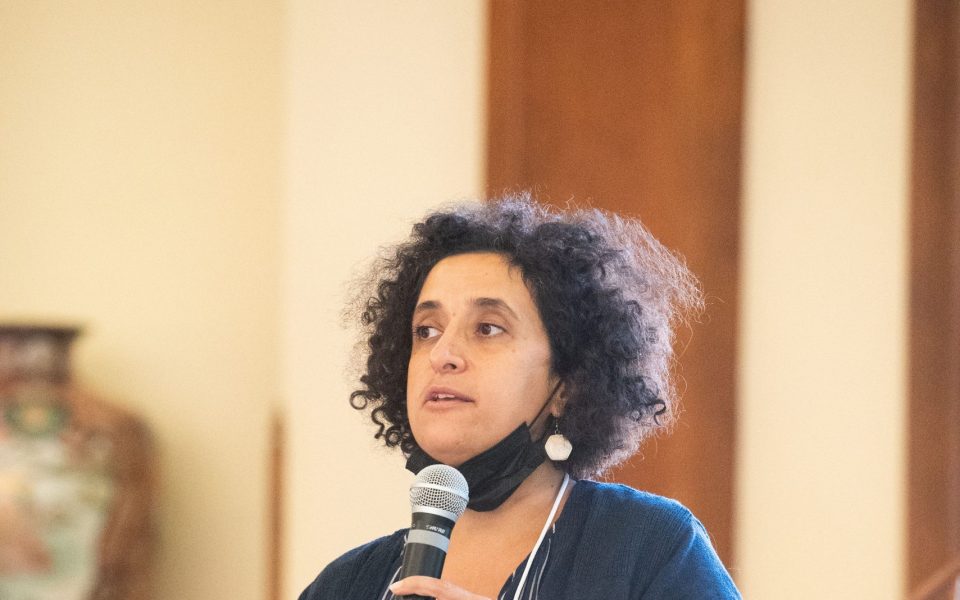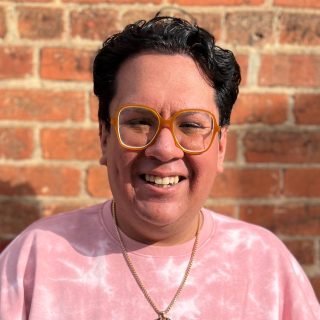Featured photo: Dr. Diya Abdo at the 2022 ECAR Gathering (photo by Autumn Hollifield Photography)
Dr. Diya Abdo often ponders how the world could be.
In 2015, Dr. Diya Abdo founded Every Campus A Refuge on Guilford College’s campus.
Since its inception, ECAR has worked on building chapters with colleges and universities across the country, leveraging their resources to assist refugee resettlement processes in their communities. To date, there are 12 ECAR chapters across the country, including a chapter at Wake Forest University.
On Sept. 23, ECAR’s mission brought nearly 200 people from across the country to Greensboro for the first-ever ECAR Gathering hosted at Guilford College. Over soft murmurs, warm hugs and enthusiastic hellos, the event exuded the energy of a communal event, as if everyone in attendance was part of the same family.
“I think of the gathering as the anti-conference,” Abdo shared. “We wanted to design something where people could come together and build community.”
The three-day event involved panels, activities, workshops, a film screening and a roundtable discussion. The goal was to share the work happening on campuses and in communities to develop best practices.
“What ECAR tries to do is ensure that higher education is a part of its community, and that when we say it we mean that,” Abdo explained.

Venturing from a concrete sidewalk on Guilford’s campus to a dirt path created from centuries of treading feet, a group enters Guilford Woods. Max Carter leads the 15-person group through an Underground Railroad Tour sharing stories of people who have sought refuge in the woods.
A former Guilford College professor and former director of the Friends Center, Carter said that young men escaped being drafted into wars during the 1800s by hiding in the woods while runaway slaves sought refuge under the same tall oak trees. The forest, he explained, embodies a history of protection and safety.
The group ventured onwards, arriving at a viewing platform. In front of them towered a tulip poplar tree that sheltered the whole group. Carter invited attendees to think about all that this tree has witnessed: a living testimony to a history of refuge and protection next to the Quaker college.
This history reverberates to the present day for ECAR. How can communities provide protection to the refugees in their community?
The Gathering’s purpose was to mobilize colleges and universities to adopt ECAR and work collectively within their communities. Adbo sees higher education working “collaboratively to develop an ecosystem” and working in tandem with local organizations and nonprofits.
“It’s every organization contributing something to a new home and where belonging can be felt,” Abdo said.

The event was made possible through a $40,000 grant from Welcoming America, which believes all people, including immigrants, are integral pieces to communities and their successful futures.
Using the grant, ECAR is tasked with developing a AHLAN Manual. “Ahlan” is used to express “welcome” in Arabic, its literal meaning of “kin” or “family”. The manual would be an open-access tool providing best practices. An additional benefit is communities can directly apply the recommendations to where they live. Attendees of this inaugural event will contribute to the work of the AHLAN Manual.
“Everyone who makes up a community and who has a part in the resettlement process, we wanted to develop the manual with their help”, Abdo said.
During her presentation, Dr. Suzy Ismali, founding director of Cornerstone, a nonprofit, faith-based communication organization, paused during her workshop titled “Mental Health Support for Refugees.” She asked how others approach trauma-informed care for refugees.
“It is good that this gathering connected us,” said Mona Flynn of the Yoga Connection, an ongoing community-service project that uses yoga to strengthen the body, mind, and spirit, for immigrant and refugee women. “We can do our work better and really hear what we need to provide [to this community].”

Personal conversations around trauma, finding community and how refugees connect with others made up some of the conversation. Some shared how groups can struggle to connect with others like them because of physical distance while others shared how their own experience helps them support others like them. Endy Mendez is one of those people who immigrated to the United States when she was 12 and now works to support immigrants in Greensboro.
“We have known the trauma and mental-health issues of immigrants and refugees,” said Mendez who works for FaithAction International House.
Because of Dr. Ismali’s workshop, she said, it will be easier for others who work in supporting refugees to put into words what they frequently see in their work.
The ending of the gathering echoed its beginning with laughter and smiles, reflections over food, and an opportunity to connect one last time. Mixed in with the crowd were younger faces, students from the Doris Henderson Newcomers School and the Experiential School of Greensboro, who ran around the quad, some waiting in line for food, others standing with parents as they perused items for sale from local vendors.
“When we are looking at the future of what we want to be, any talk of the future needs to include youth voices,” said Kathleen Herbst, the coordinator for youth activities for the event.
Their involvement points to the gathering’s intention to have a lasting impact for generations to come.
“I’m feeling energized by the next steps,” said Abdo, who hopes to have more events like the inaugural one in the future. “The gathering is not the end, it is the beginning of people learning from each other.”
Learn more about ECAR at everycampusarefuge.net.
Join the First Amendment Society, a membership that goes directly to funding TCB‘s newsroom.
We believe that reporting can save the world.
The TCB First Amendment Society recognizes the vital role of a free, unfettered press with a bundling of local experiences designed to build community, and unique engagements with our newsroom that will help you understand, and shape, local journalism’s critical role in uplifting the people in our cities.
All revenue goes directly into the newsroom as reporters’ salaries and freelance commissions.


Leave a Reply